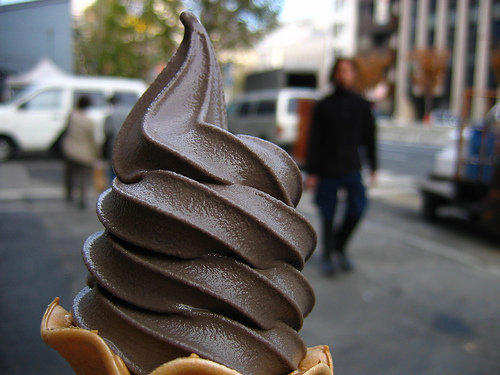I was once asked if the Japanese eat any flavors of ice cream other than Green Tea. The answer, of course, is a resounding yes — they’re quite into various types of ice cream, from standard flavors that everyone knows to some unique varieties that may seem a little odd to you or me. Take a trip to a Japanese ice cream shop and you’ll see plenty of familiar flavors, like vanilla and chocolate and sakura (cherry), as well as some flavors that might be new to you, like ume (Japanese plum), sweet potato or traditional sweet azuki beans. Often, ice cream makers base new flavors on food trends, like rose flavored ice cream to make your body smell nice from the inside out, healthy “black sesame” ice cream, or this year’s big boom, mango. Every once in a while I run across articles about really rare flavors of ice cream in Japan, like crab, octopus, beer or wasabi. While these products do exist, they’re not generally eaten by the average Japanese person, and usually represent some region of the country’s efforts to define themselves as the “squid ink flavored ice cream capital of Japan” or something. Since the Japanese like to pretend they’re culturally closer to Europe than to Asia, ice cream is often consumed in the form of gelato, although “soft cream” (what soft-serve ice cream is called here) is also popular. One of our family’s favorite treats is to take standard vanilla ice cream and sprinkle matcha powder over the top, which is great when it all starts to melt together. By happy coincidence, we just happen to have gotten some matcha powder in stock today.

Yes, Virginia, there really is squid ink ice cream…
One thing that always frustrated me as an ESL teacher was my students’ over-reliance on dictionaries. Language is about communication, and as a general rule conversations stop when one party puts their nose in a dictionary to look up a word. It’s therefore important to learn how to get around difficult words that would otherwise create a linguistic roadblock, to be able to explain a concept in a different way. I once went hitchhiking up to Northern Japan, and during my trip I decided I wanted to buy a flashlight so I could read in dark places. Trouble was, I didn’t know the word for flashlight in Japanese, so I had to describe what I meant in other ways until I want I wanted — it was surprisingly challenging. In ESL class I’d split my students up into groups and have them describe various words to each other, to help them get used to communicating ideas indirectly. This is extremely important when, say, talking about Japan to people form other countries. Let’s say a Japanese person wanted to describe a kotatsu — a low table with a heater inside and a blanket over the top, which is used in the winter to warm your legs — to someone from another country. No dictionary will help since the concept is totally foreign, and it’s important for them to learn how to find other words for what they want to say.
“Netz. Make the style.” This is the official slogan of Toyota’s “Nets” showrooms in Japan, used in most of their TV commercials. I’m not quite sure why virtually every Japanese company has to have a slogan in English — perhaps it’s tied to my theory that use of English allows advertisers to access emotions in viewers that couldn’t be reached any other way — but nearly every company has one. They’re designed to give you a positive image of the company in encapsulated form, such as small-car maker Daihatsu’s “We Do Compact” or UCC Coffee’s “Good Smile Coffee.” The Meiji chocolate company’s slogan is “Delicious…open!” which brings to mind opening one of their packages to find something good inside. When Mitsubishi started having problems with its vehicles, it quietly changed its official slogan from “Heart-Beat Motors” to “Changes for the Better” to show that they were working to fix their products, although I’m sure no one noticed by us gaijin. One of my favorites company slogans belongs to Hitachi, creator of many products from electronics to the bullet trains. Their slogan is “Inspire the Next,” and they use it both in and outside of Japan, despite its slightly wonky sound — good for them. It’s not hard to find odd-sounding company slogans. For example, my wife shops at a drug store that declares itself the “Wellness Business for National Confidence.” Pretty good for a small chain of drug stores located in one city in Japan!















